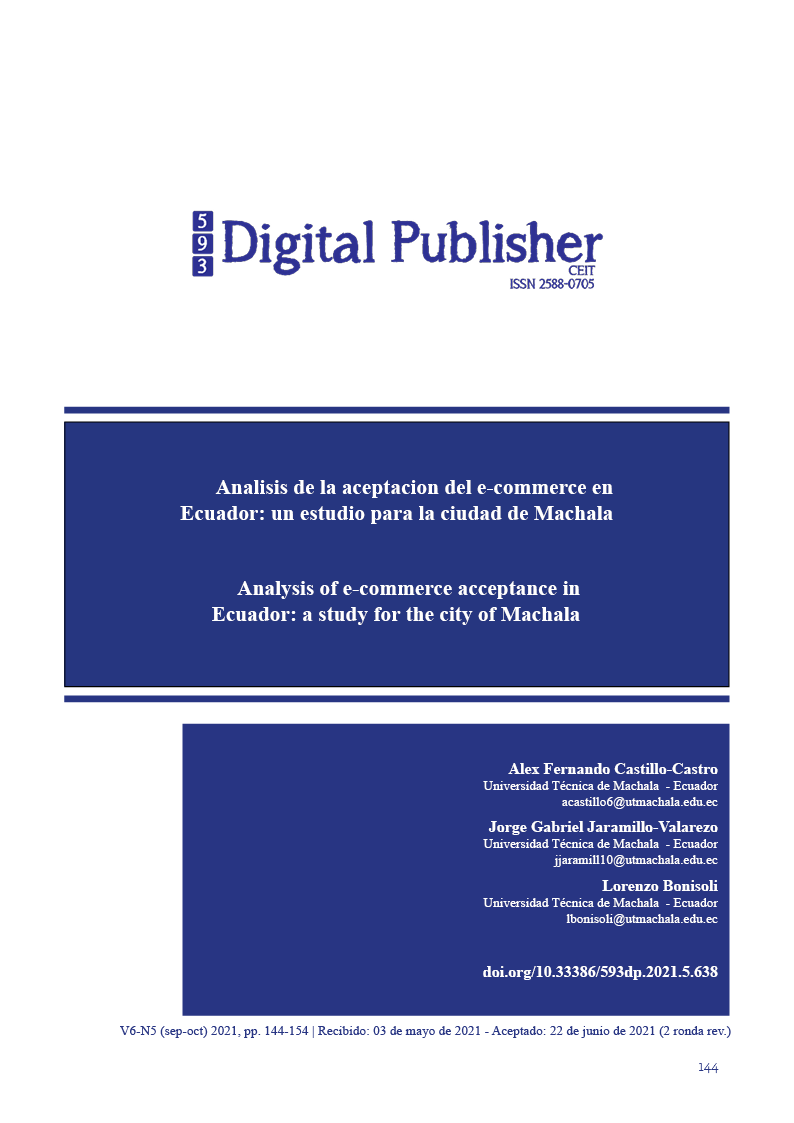Analysis of e-commerce acceptance in Ecuador: a study for the city of Machala
Main Article Content
Abstract
E-commerce over the years, due to technological advances, has undoubtedly been a purchasing method that has been growing throughout the world, so the study of technological acceptance is of the utmost importance at an academic level. as for companies. The objective of this research is to evaluate the reasons why e-commerce has not had a complete acceptance in the city of Machala, for this we will use the technological acceptance model (TAM), this model contains two variables that are the ease of use and utility of use, in addition to that we add two more constructs that are perceived security and perceived trust to propose a research instrument adapted to the case of the city of Machala. This model is applied to a sample from the city of Machala, where it was possible to obtain as a result that the four variables followed a sequence in which ease of use is the starting point, ending in the perceived trust where all the variables have a direct influence. The results fill existing gaps and also provide suggestions for future research on e-commerce acceptance.
Downloads
Article Details

This work is licensed under a Creative Commons Attribution-NonCommercial-ShareAlike 4.0 International License.
1. Derechos de autor
Las obras que se publican en 593 Digital Publisher CEIT están sujetas a los siguientes términos:
1.1. 593 Digital Publisher CEIT, conserva los derechos patrimoniales (copyright) de las obras publicadas, favorece y permite la reutilización de las mismas bajo la licencia Licencia Creative Commons 4.0 de Reconocimiento-NoComercial-CompartirIgual 4.0, por lo cual se pueden copiar, usar, difundir, transmitir y exponer públicamente, siempre que:
1.1.a. Se cite la autoría y fuente original de su publicación (revista, editorial, URL).
1.1.b. No se usen para fines comerciales u onerosos.
1.1.c. Se mencione la existencia y especificaciones de esta licencia de uso.
References
Ajzen, I., & Fishebein, M. (1977). Attitude-Behavior Relations: A Theoretical Analysis. Psychological Bulletin, 84(5), 888-918.
Al-Gahtani. (Enero de 2011). Modeling the electronic transactions acceptance using an extended technology acceptance model. ScienceDirect, 9(1), 47-77. Obtenido de https://www.sciencedirect.com/science/article/pii/S2210832710000050?via%3Dihub
Bosque, A. R., & Herrero, A. (2008). ANTECEDENTES DE LA UTILIDAD PERCIBIDA EN LA ADOPCION DEL COMERCIO ELECTRONICO ENTRE PARTICULARES Y EMPRESAS. CUADERNOS DE ECONOMIA Y DIRECCION DE LA EMPRESA, 107-134. Obtenido de https://www.sciencedirect.com/science/article/pii/S1138575808700550
Castells, M. (Octubre de 2000). Internet y la sociedad red. In Conferencia de Presentación del Programa de Doctorado sobre la Sociedad de la Información y el Conocimiento. , 7, págs. 1-13. Obtenido de http://www.uoc.edu/web/cat/articles/castells/print.html].
Cheung , C., & Lee, M. (2005). Consumer Satisfaction with Internet Shopping: A Research Framework and Propositions for Future Research. ACM International Conference Proceeding Series, 113, 327-334.
Cruz, N. K. (Abril-Junio de 2017). El Comercio Electronico en el Ecuador. JOURNAL OF SCIENCE AND RESEARCH: REVISTA CIENCIA E INVESTIGACION, 29-32.
Das Chagas , M., Medeiros, M., Melo, F., & Veras, M. (2014). Revisión de la bibliografía sobre los estudios del comportamiento del consumidor online en el área de turismo. Estudios y perspectivas en turismo, 23(3), 526-546. Obtenido de https://dialnet.unirioja.es/servlet/articulo?codigo=5118239
Davis. (1989). User acceptance of computer technology: A comparison of two theoretical models. Management science, 35(8), 982-1003.
Davis, F. (1989). Perceived usefulness, perceived ease of use, and user acceptance of information technology. MIS quarterly, 319-340.
Davis, F. (1989). Perceived Usefulness,. MIS Quarterly, 319.
Fishebein, M., & Ajzen, I. (1975). Belief, attitude, intention, and behavior: An introduction to theory and research.
Flavián Blanco, C., & Guimalíu Blasco, M. (2007). Un análisis de la influencia de la confianza y del riesgo percibido sobre la lealtad a un sitio web: el caso de la distribución de servicios gratuitos. Revista europea de dirección y economía de la empresa, 16(1), 159-178.
Gefen, D. (2000). E-commerce: the role of familiarity and trust. Omegan, 28(6), 725-737.
Grewall, D., & Levy, M. (Diciembre de 2009). Emerging Issues in Retailing Research. Journal of Retailing, 85(4), 522-526. Obtenido de https://www.sciencedirect.com/science/article/abs/pii/S0022435909000669?via%3Dihub
Herrera, C. (Junio de 2015). La influencia de la globalizacion en la economia del estado-nación. Dialogos de saberes(48), 79-88. Obtenido de https://l.facebook.com/l.php?u=https%3A%2F%2Frevistas.unilibre.edu.co%2Findex.php%2Fdialogos%2Farticle%2Fview%2F189%2F142%3Ffbclid%3DIwAR12fX-pGBcjMMYmwgKzztA9C7jWd4Zd6BTvt54KPkIpi9HOEL7kV0Azzlk&h=AT2-4HZ6IdVbn5CirgY6x5LzwqAHVjOOGKGzr5cO01lP68FEXkp45fvoDG
Juan, T. M., Juan, S. G., & Bernardo, B. D. (2011). ACEPTACION DEL E-COMMERCE EN COLOMBIA: UN ESTUDIO PARA LA CIUDAD DE MEDELLIN. Medellín, Colombia. Obtenido de https://www.redalyc.org/articulo.oa?id=90922735001
Kim, D., Ferrin, D., & Lee, C. (2011). The effect of perceived trust on electronic commerse: Shopping online for tourism products and services in South Korea. Tourism Management, 32(2), 256-565.
King, W., & He, J. (Agosto de 2006). A meta-analysis of the technology acceptance model. Information & management, 43(6), 740-755.
Kolsaker, A., & Payne, C. (1 de Julio de 2002). Engendering trust in e‐commerce: a study of gender‐based concerns. Marketing Intelligence & Planning, 20(4), 206--214.
kotler, p., & Armstrong, G. (2003). Fundamentos de marketing. Pearson educación.
Kshetri, N. (2007). Barriers to e-commerce and competitive business models in developing countries: A case study. 6(4), 443-452.
Luis, Y., Luis, R., & Julián, C. (Abril de 2010). Modelo de aceptación tecnológica (tam): un estudio de la influencia de la cultura nacional y del perfil del usuario en el uso de las tic. INNOVAR. Revista de Ciencias Administrativas y Sociales, 20(36), 187-203. Obtenido de https://www.redalyc.org/pdf/818/81819028014.pdf?fbclid=IwAR1B1iZ6EMukFwiWhCXjUoYadAxkk-BTBzchCxBhDlRDvS_k_PlZd9yVGcE
McKnight, D., Choudhury, V., & Kacmar, C. (2002). Developing and Validating Trust Measures for e-Commerce: An Integrative Typology. Information Systems Research, 13(3), 334-359.
Mieles, J., Albán, D., Valdospin, J., & Vera, D. (14 de Noviembre de 2018). E-COMMERCE:UN FACTOR FUNDAMENTAL PARA EL DESARROLLO EMPRESARIAL EN EL ECUADOR. ECOCIENCIA, 1-17. Obtenido de http://revistas.ecotec.edu.ec/index.php/ecociencia/article/view/156/124
Palvia, P. (2009). The role of trust in e-commerce relational exchange: A unified model. Information & Management, 46(4), 213-220.
Reyes, G. (Junio de 2001). Teoría de la gloabalización: Bases fundamentales. Tendencias, 2(1), 43-53. Obtenido de https://www.redalyc.org/pdf/181/18100308.pdf
Reynolds, J. (2001). El libro completo del e-commerce. En J. Reynolds, El libro completo del e-commerce. España: Ediciones Deusto.
Rodríguez del Bosque, I., & Herrero Crespo, Á. (Marzo de 2007). Antecedentes de la utilidad. Cuadernos de Economía y Dirección de la Empresa, 11(34), 107-134. Obtenido de https://www.sciencedirect.com/science/article/pii/S1138575808700550
Sanzo, M. J., Santos, M. L., Vázquez, R., & Álavarez, L. I. (Mayo de 2003). The effect of market orientation on buyer–seller relationship satisfaction. Industrial Marketing Management, 32(4), 327-345. Obtenido de https://www.sciencedirect.com/science/article/abs/pii/S0019850101002000
Sathye, M. (1 de Diciembre de 1999). Adoption of Internet banking by Australian consumers: an empirical investigation. International Journal of Bank Marketing, 17(7), 324-334.
Suh, B., & Han, I. (2003). The impact of trust and perception of security control on the acceptance of electronic commerce. International Journal of Electronic Commerce, 7(3), 135-161.
Tavera, J. f., & Londoño, B. E. (ENERO-JUNIO de 2014). FACTORES DETERMINANTES DE LA ACEPTACION TECNOLOGICOS DEL E-COMMERCE EN PAISES EMERGENTES. REVISTA CIENCIAS ESTRATEGICAS, 22(31), 101-119. Obtenido de https://www.redalyc.org/pdf/1513/151332653007.pdf




